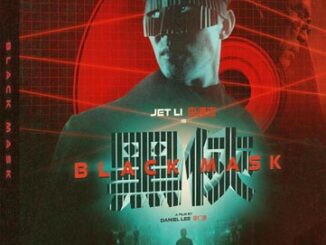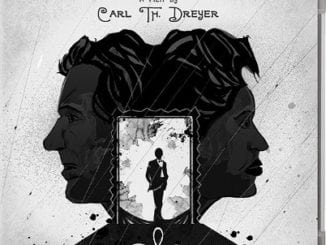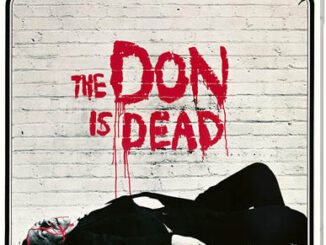The Dead and the Deadly (1982)
Directed by: Barry Wong, Wu Ma
Written by: Sammo Hung
Starring: Cherie Chung, Lam Ching-Ying, Sammo Hung, Wu Ma
AKA REN XIA REN, PEOPLE SCARE PEOPLE
HONG KONG
AVAILABLE ON BLU-RAY: 21ST NOVEMBER, from EUREKA ENTERTAINMENT
RUNNING TIME: 99 mins
REVIEWED BY: Dr Lenera

Wah Li, known as Fat Boy to most, lives with his Great-Uncle Yee. Together with his oddball friends Lai Li and Momo, Wah Li helps Yee run the local funeral service. When the body of one of Wah Li’s friends, Ma Lucho, is brought back to the village by a new and pregnant wife and her “brother,” Wai Li is suspicious, because Ma Lucho had previously shown himself to be impotent. Wah Li goes to inspect the body in the funeral parlour, and fails to realise that Ma Lucho is well and truly alive and part of a scam to steal some valuable family antiques. Wah Li seems convinced that Ma Lucho is dead, reasoning that it’s his ghost when he scares him away, but then Ma Lucho’s accomplices decide they want him dead for real….

Unlike its two similar cousins Close Encounters Of The Spooky Kind and Mr Vampire, The Dead And The Deadly hasn’t been seen that much in the West. Would you believe it, this is its first home viewing release in the UK, even though it did turn up once on TV, a showing which I sadly happened to miss. Therefore this is the first time I’ve seen this one, and I must say it surprised me a bit at first, being a comedy first and foremost with the action secondary and the horror barely there at all despite all its supernatural shenanigans. Nonetheless the reason for its lack of exposure outside of Hong Kong is very hard to fathom. Yes, it’s the least action-centric of the three films, and it spends a hell of a lot of time on comedy routines and Taoist magic rituals which at times take it close to genuine Chinese opera, but distributors used to always be happy shortening Hong Kong films and, while it’s not quite a genuine classic like those two, it’s still a hugely entertaining watch. The farcical goings-ons, most of which involve dead bodies, people pretending to be dead or coming to life, and which certainly ought to keep the most of us smiling and sometimes even laughing, keep things moving at a fast pace except for the occasional set piece which goes on too long, the plot has its surprises and becomes geneuinely unpredictable and it’s a rare Hong Kong film of its day where a female character is the one who sets out to save the day, and on her own, in the final act. The director is Wu Ma also wrote the script with Barry Wong, and he actually helmed quite a few films though is best known as a very familiar face in Hong Kong cinema, chiefly in small roles but also as Taoist swordsman Yin Chek Ha in A Chinese Ghost Story.
The film sets out its stall right from the very beginning when we see a man knocking, then scratching and miaowing at a door, while another, our hero Wah Li watches, commenting “cat’s mating call”. Indeed the visitor enters to meet a woman. She won’t sleep with him until it’s been seven days since her husband died, but he sure is persistent, and she seems to be giving in to him, but Wah Li climbs in though a window and dresses up as a ghost to scare them away, only he falls down the stairs. Then the ghost of the dead husband shows up and frightens all three of them before strangling his wife and her suitor, something that doesn’t seem like a big deal to him, before threatening Wah Li with death if he tells anyone else what’s just happened – and then we get the director’s credit, the titles having appeared throughout this whole sequence. Honestly, if this opening scene doesn’t sound like fun then I wouldn’t suggest you bother with the film, but I reckon that most readers will have experienced this kind of stuff in Hong Kong movies before. Wah Li is found unconscious on the ground, then is chased when he wakes up and the others accuse him of cheating them. Like the characters Jackie Chan usually played around this time, he’s apparently always getting into trouble, but Chan was never as harsh to a female admirer as Wah Li is here to Miss Yuen; they were promised to each other before they were even born but all is does here is mock her gift to him, his excuse being “she’s too nice for me, I don’t want to ruin her life”. Maybe he means it, but it’s always a bit of a cop out. And now we get a really low comedy set piece which sure made me laugh but which probably prohibits this one from being seen by young children. Wah Li and his 80-year old friend Ma Lucho are in a brothel and the latter goes off with a hooker the madame was almost forcing upon Wah Li. He takes bull’s penis and seal’s penis to give him vitality but it doesn’t work; Wah Li on the other hand takes them and walks about the place with an erection which he just can’t get rid of. Well it’s funny to me.
Wah Li is puzzled by Ma Lucho’s sudden death and him having fathered a child. To get to examine the body, he has to dress up as one of several paper statues and his friends and co-habitees at Great-Uncle Yee’s place Lai Li and Momo, with some effort, carry him inside to the bafflement of others [these statues should be really light] where a naughty little boy pesters him with a pea shooter, an incense stick and almost a candle, Wah Li of course having to keep quiet in one of the funniest comedic portions. Wah Li gets into the room with the body but his strange form of examination – with the supposedly dead person actually being alive – is interrupted when a robber enters, keen on ripping Ma Lucho’s gold tooth out, so Wah Li scares him away, but not before painfully ripping out the gold tooth anyway. Then Wah Li decides to do an autopsy, but thankfully for the poor Ma Lucho who spends a hell of a lot of time being virtually tortured, somebody stops him and does a test for poison which comes out negative, after which it’s Ma Lucho’s turn to scare Wah Li away, though not before his supposed wife Lee Yuet Ying tells Wah Li that the baby is a result of her being raped. It’s then decided by his accomplices that Ma Lucho would be better off dead, but in this movie the dead can’t be expected to stay that way, so Ma Lucho is soon up and about again, but despite the fact that only Wah Li can see him, it’s not working out particularly well for him. “Even being a ghost doesn’t work in my favour” he laments, especially when Yee is there with his spells and a vine whip which with each strike “can shorten a ghost by three inches”, though he’s rather doddery, and Miss Yuen may have to help, what with possession, ghost guards right out of the Cantina Band who love wine and cheese, and two Wah Li’s. But her smelly underwear might help, since ghosts don’t like such a thing.

In terms of fighting, there’s a bit where Lee Yuet Ying fights off the other villains because she tried to commit suicide, but the scene is over before it’s barely began. Then Ma Lucho is attacked by some of his own people dressed as ninjas; they make a spectacular, acrobatic entrance with cool throbbing music, then after some decent fighting Fat Chung as the main villain joins in, but Ma Lucho is killed very soon, despite being played by the film’s director Wu Ma. Hung does eventually get a chance to show his stuff, even though it’s when his character is possessed by another, with some great moves and displaying of force, but it’s not the film’s climax, there being another twenty or so minutes to go, which is fine as long as one realises that we’re not supposed to take this film as a martial arts piece, the limited action not being important. Despite this being a film where lots of martial arts actors, including a lot of Hung’s usual stunt team, don’t do martial arts, there’s and advantage in that we get more of a sense of a proper story unfolding, and it certainly takes some unusual turns, eventually centering on female unconditional love and bravery which differs greatly from the portrayal of women in Hong Kong films anyway [the femme fatale subgenre hadn’t yet erupted]. There’s an element of poignancy in the journey of both Cherie Chung’s character and, even more so, Hung’s, with things finishing in a way that’s not entirely happy, despite the message of “life is short we might as well enjoy it when we can”. Talking of female characters though, Mei Hui Leung as Lee Yuet Ying is a fairly interesting villainess who’s game and motifs we’re not always sure about. She dies in a rather cruel fashion.
There’s a nice if cliched scare moment where a hand belonging to somebody who’s supposedly dead comes out from under a sheet to grab the person sitting on the bed, but that’s really it in terms of horror. However, the special effects, if undeniably primitive, are fine; in fact I’d go as far to say that the wire work is amongst the very best, even in High Definition. Much of The Dead And The Deadly consists of comedy set pieces. Most do amuse, but sometimes too long, especially when Ma Lucho starts to enjoy being a ghost, and it gets confusing in terms of who can see who, but there’s more consistency than you might expect, plus some understated humour too. The rituals also take up time, but it’s great to see Lam-Ching Ying, Mr Vampire himself, playing an earlier Taoist priest who’s too elderly to perform everything so he has to be helped, as does Yeung, an official who’s always plastered and one of two cross-eyed characters. Hung’s part allows him to show his diversity as a performer. Ma’s direction is smooth and uses some slightly longer takes than, say, Hung would have done, while, despite there being three cinematographers – Yiu-Tsou Cheun, Ricky Lau and Yu-Tang-Li – it does look as if one person could have done it all, with uniformity of visual style. While we’re used to lots of blue to signify ghosts, there’s also some very theatrical green, plus nice use of different rooms e. The soundtrack has a few sections typical of Hong Kong movie music that would come after when things shifted to original scores, but it’s most notable for its used of electronic sounds, some of it from Tangerine Dream and some of it either from a similar group or composer or newly written in that style. It’s a tad jarring at times but adds to the film’s charm.
All in all The Dead And The Deadly is a hoot with a bit of genuine heart which gives it some resonance as the familiar Hong Kong movie freeze frame comes up at the end. However, there’s one more thing that I feel I ought to mention, something that I didn’t want to mention earlier just in case I felt inclined to mention it again and again. Ma sports a false nose which is quite spectacular in how unconvincing it is. However, this means that it’s also hugely distracting. I guess this doesn’t matter too much considering the comedic nature of the film, but be warned. You may not be able to get the nose out of your mind. You may dream about the nose.
Rating: 









I can’t compare it to any previous version as I’ve never owned any, but I’ll certainly take the word of the guys doing the audio commentaries that this restoration is of top quality. In fact I’d say that, at least in this incarnation, this is a better looking film than either Close Encounters Of The Spooky Kind or Mr Vampire. The various colour schemes come off really well and the blacks are deep, while limited use of opticals means that grain level stays consistent.
SPECIAL FEATURES
Limited Edition O-Card slipcase featuring new artwork by Darren Wheeling
Original Cantonese mono audio [theatrical mix]
Original Cantonese mono audio [home video mix]
Optional English mono dubbed audio
The Dead And The Deadly was made at a time when the English dubs were losing their flavour, so I tend to listen to films of this time and later with their original Hong Kong dubs, though I do switch over a times just to check the English dubs out. The one here isn’t bad though dialogue is often significantly different to the English subtitles English for the Cantonese dubs.
Optional English Subtitles, newly translated for this release
New feature length audio commentary by Asian film experts Frank Djeng [NY Asian Film Festival] & Michael Worth
Djeng and Worth are on top form as they discuss this film; in fact I’d say that this track is livelier and more enthusiastic than their last few, with the two even joking about Djeng’s liking for saying “also available from Eureka”. Djeng thinks that Wong wrote the humorous parts of the screenplay, while Worth thinks Wu may have learned his economical filming style from Steven Spielberg. As usual Djeng explains things that us westerners wouldn’t get, such as Ma’s character’s name being slang for “horse’s dick” despite being impotent. And I never knew that Shaw Brothers’ top director Chang Cheh may have started off this shooting silent malarky because of all the different languages. Very good.
New feature length audio commentary by action cinema experts Mike Leeder & Arne Venema
Leeder and Venema are also at their best on their track, with bizarrely more explanation of the customs and rituals seen than in the previous commentary; apparently people burn bits of paper versions of things so that the dead will receive said things in the afterlife. Leeder says that a stuntman at a shoot he was at fell off a roof; he was the only person who didn’t burn incense for good luck that day. We also hear that strippers used to be a thing at weddings and funerals in Hong Kong[!], and lots of amusing byplay, possibly reaching a high or low point during the viagra scene, but both go on about the nose too and rightly so. There’s a bit less about the actual film here, but it’s such fun listening we don’t really care.
Sammo Hung Interview at the 2016 Udine Film Festival” [21 mins]
Hung often seems slightly a bit guarded in interviews, but he acts genuinely happy and comes across as pretty warm in this and the next featurette, even if sometime struggles to find the right English words or terms and an interpreter has to help out. He answers questions on subjects like why he wanted to be a director [Wong Fung just offered the job of directing to him], but of most interest is his discussing of his times with Bruce Lee, from trying to kick Lee and having his foot instantly pushed into his face, to Lee specifically calling him up for Enter The Dragon. He also talks of two future projects, one with him and Lau Kar-Leung as old masters, one about lion dancing. He hasn’t yet made either, but here’s hoping.
Sammo Hung Q and A at the 2016 Udine Film Festival [57 mins]
In fact Hung likes to talk of things he wants to do but which he hasn’t yet fulfilled, here mentioning at length and with passion the sorry state of the Hong Kong film industry, with young people not wanting to go into film and martial artists in China not having the opportunity, and what he intends to do about it. There’s also much chat about the film that was about to show, his first directorial job in 18 years The Bodyguard. Hung is nice and humorous, from answering his first question with “The Bodyguard is good movie” to wanting to do a love story “looking for the sex”. Even though somebody unfortunately asks him a question about football, he tells an amusing story about he and Jackie Chan forming teams while making movies and having matches, Chan once cheating in a rather naughty way, and ends with the important message of “spend more time with your elders”. Hung is on great form in this Q and A which, even if it never mentions The Dead And The Deadly, is a real treat for fans.
Original Hong Kong theatrical trailer
A Limited Edition collector’s booklet featuring new writing by James Oliver
A film which can be enjoyed even by those who dislike martial arts, ‘The Dead And The Deadly’ is, despite its title and subject, an invigorating mix of bonkers plotting and diverse comedy. Hopefully Eureka’s typically fine release will finally give it a decent audience in the UK. Recommended!





Be the first to comment